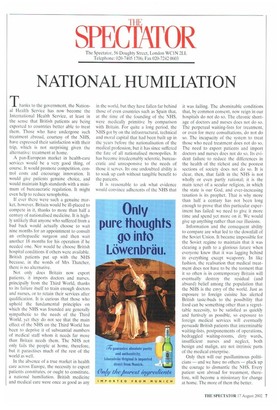NATIONAL HUMILIATION
Thanks to the government, the National Health Service has now become the International Health Service, at least in the sense that British patients are being exported to countries better able to treat them. Those who have undergone such treatment abroad, courtesy of the NHS, have expressed their satisfaction with their trip, which is not surprising given the alternative: treatment at home.
A pan-European market in health-care services would be a very good thing, of course. It would promote competition, control costs and encourage innovation. It would give patients genuine choice, and would maintain high standards with a minimum of bureaucratic regulation. It might even help to reduce xenophobia.
If ever there were such a genuine market, however, Britain would be ill-placed to compete in it, thanks to more than half a century of nationalised medicine. It is highly unlikely that anyone who suffered from a bad back would actually choose to wait nine months for an appointment to consult an orthopaedic surgeon and then wait another 18 months for his operation if he needed one. Nor would he choose British hospital conditions if others were available. British patients put up with the NHS because, in the words of Mrs Thatcher. there is no alternative.
Not only does Britain now export patients, it imports doctors and nurses. principally from the Third World, thanks to its failure itself to train enough doctors and nurses, or to retain their services after qualification. It is curious that those who uphold the fundamental principles on which the NHS was founded are generally sympathetic to the needs of the Third World, yet they do not see that the main effect of the NHS on the Third World has been to deprive it of substantial numbers of medical staff whom it needs far more than Britain needs them. The NHS not only fails the people at home, therefore, but it parasitises much of the rest of the world as well.
In the absence of a true market in health care across Europe, the necessity to export patients constitutes, or ought to constitute, a national humiliation. British medicine and medical care were once as good as any in the world, but they have fallen far behind those of even countries such as Spain that, at the time of the founding of the NHS, were medically primitive by comparison with Britain. For quite a long period, the NHS got by on the infrastructural, technical and moral capital that had been built up in the years before the nationalisation of the medical profession, but it has since suffered the fate of all nationalised monopolies. It has become irredeemably sclerotic, bureaucratic and unresponsive to the needs of those it serves. Its one undoubted ability is to soak up cash without tangible benefit to the patients.
It is reasonable to ask what evidence would convince adherents of the NHS that it was failing. The abominable conditions that, by common consent, now reign in our hospitals do not do so. The chronic shortage of doctors and nurses does not do so. The perpetual waiting-lists for treatment, or even for mere consultations, do not do so. The incapacity of the system to treat those who need treatment does not do so. The need to export patients and import doctors and nurses does not do so. Its evident failure to reduce the differences in the health of the richest and the poorest sections of society does not do so. It is clear, then, that faith in the NHS is not wholly or even partly rational; it is the main tenet of a secular religion, in which the state is our God, and ever-increasing taxation is its prophet. That is why more than half a century has not been long enough to prove thatthis particular experiment has failed: we need to give it more time and spend yet more on it. We would give up anything rather than our illusions.
Information and the consequent ability to compare are what led to the downfall of the Soviet Union. It became impossible for the Soviet regime to maintain that it was clearing a path to a glorious future when everyone knew that it was lagging behind in everything except weaponry. In like fashion, the realisation that medical treatment does not have to be the torment that it so often is in contemporary Britain will eventually destroy the residual (and absurd) belief among the population that the NHS is the envy of the world. Just as exposure to foreign cuisine has alerted British taste-buds to the possibility that food can be something other than a regrettable necessity, to be satisfied as quickly and furtively as possible, so exposure to foreign medical services will eventually persuade British patients that interminable waiting-lists, postponements of operations, bedraggled waiting-rooms, dirty wards, insufficient nurses and neglect, both benign and malign, are not intrinsic parts of the medical enterprise.
Only then will our pusillanimous politicians — and we have no others — pluck up the courage to dismantle the NHS. Every patient sent abroad for treatment, therefore, will become a missionary for change at home. The more of them the better.






























































 Previous page
Previous page